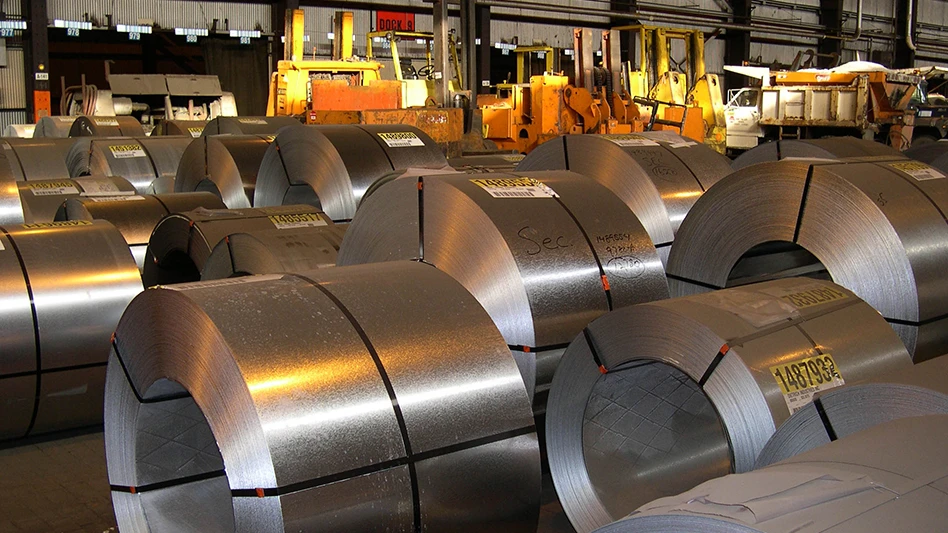
Photo courtesy of US Steel
The U.S. and the European Union have extended the deadline for negotiations on the Global Arrangement on Sustainable Steel and Aluminum (GSA) until the end of the year, according to a joint statement issued Oct. 20 by the White House on the U.S.-EU Summit.
Beginning Oct. 31, 2021, the EU and U.S. started negotiating the GSA to address carbon intensity and global overcapacity in the steel and aluminum sectors. The deadline for negotiations originally was set for Oct. 31 of this year. However, that deadline has been extended by two months. While leaders from the U.S. and EU say that “substantial progress” has been made on the nonmarket excess capacity pillar of the GSA in the recent talks, a deal has yet to be reached to form a low-carbon steel and aluminum mechanism.
The decision to negotiate the GSA was the result of an agreement in October 2021 to suspend the Section 232 tariffs on steel and aluminum imports from the EU, in addition to retaliatory measures imposed by the EU on certain U.S. exports, through the end of 2023. The U.S. imposed a temporary tariff-rate quota (TRQ) system that would allow for historical levels of EU imports to enter the U.S. market tariff-free—3.3 million metric tons per year for steel and 384,000 metric tons per year for aluminum, as reported by S&P Global Commodity Insights.
While the steel/aluminum tariffs and retaliatory measures from the EU are set to go back into place Jan. 1, 2024, it is expected that the Biden administration will not immediately reimpose the tariffs in early 2024 if negotiators cannot reach a final agreement on the GSA, according to the Institute of Scrap Recycling Industries (ISRI), Washington, citing several press reports.
John G. Murphy, senior vice president for international policy at the U.S. Chamber of Commerce, and Isabelle Icso, the organization’s director of international policy, are among those who believe the “tit-for-tat tariffs Washington and Brussels imposed in 2018-2021 seem unlikely to make a comeback.”
In a post on the U.S. Chamber of Commerce’s website, they write of a potential sticking point: “… the U.S. has been pressing for its exports to be excluded from the EU’s Carbon Border Adjustment Mechanism (CBAM),” noting that the CBAM technically entered into force Oct. 1. “The CBAM aims to ensure that goods manufactured in Europe, which are subject to a carbon price set under the EU’s Emissions Trading System, don’t face competition from imports made in countries where no similar carbon price is imposed.”
In response to the news that negotiations have been extended, Kevin Dempsey, president and CEO of the American Iron and Steel Institute (AISI), Washinton, issued a statement that reads: “The American steel industry appreciates the U.S. government’s ongoing efforts to negotiate a new international arrangement to address both nonmarket excess capacity in steel and the carbon intensity of steel imported from around the world. We are disappointed that to date the EU has not been prepared to agree to U.S. proposals to establish new trade measures that can effectively address these two key issues, which are critical to the future of both the U.S. and EU steel industries.
“We recognize that these discussions are challenging, and we thank the Biden administration for continuing to press for an agreement that ensures the long-term viability of the American steel industry,” Dempsey continues. “We will continue to advocate for an agreement that provides for meaningful and enforceable measures to restrict steel imports from all countries that contribute to nonmarket excess capacity and that also provides for tariffs on imports of higher carbon emissions intensity steel products.”
Latest from Recycling Today
- BMW Group, Encory launch 'direct recycling’ of batteries
- Loom Carbon, RTI International partner to scale textile recycling technology
- Goodwill Industries of West Michigan, American Glass Mosaics partner to divert glass from landfill
- CARI forms federal advocacy partnership
- Monthly packaging papers shipments down in November
- STEEL Act aims to enhance trade enforcement to prevent dumping of steel in the US
- San Francisco schools introduce compostable lunch trays
- Aduro graduates from Shell GameChanger program





